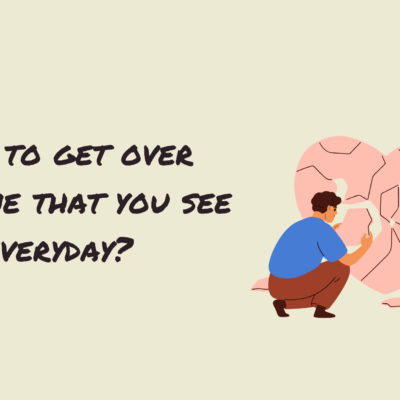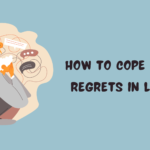How to Get over Someone that You See Everyday: Moving on from someone you love is hard, but it becomes even more challenging when you have to see them every day. Whether they are a colleague, classmate, or someone in your social circle, being constantly reminded of them can make the healing process feel impossible. You might feel stuck in a cycle of emotional pain, unable to distance yourself as much as you need.
However, it is possible to heal and regain your emotional independence, even when they are a regular part of your environment. This article will guide you through practical steps to get over someone you see every day while maintaining your peace of mind.
Also Read:
- How to Heal and Love Yourself?
- How to Heal after Breaking up with Someone You Love?
- How to Get Through a Breakup When You Live Together?
Understanding Why It’s Hard to Move On
When we go through a breakup or unrequited love, the best advice is often to “cut contact” or “distance yourself.” But what happens when that’s not an option? Seeing them daily keeps the emotional wound fresh and can prevent you from fully healing.
Here’s why it’s so difficult:
- Constant Reminders: Every interaction (or even just seeing them) reminds you of the past.
- False Hope: Frequent encounters may make you believe things could change.
- Emotional Attachment: Your brain still associates them with feelings of love and comfort.
- Jealousy and Pain: Watching them move on, talk to others, or act indifferent can hurt deeply.
While it’s challenging, you can still move forward. Let’s explore how.
Step-by-Step Guide to Moving On
1. Accept Your Feelings Without Judgment
The first step to healing is accepting that you are hurt. Trying to suppress your emotions will only make them stronger. Allow yourself to feel the sadness, frustration, or even anger that comes with heartbreak.
How to Do It:
- Write down your emotions in a journal.
- Talk to a trusted friend or therapist.
- Remind yourself that feeling hurt is part of healing.
Acceptance doesn’t mean staying stuck—it’s the first step toward letting go.
2. Set Emotional Boundaries
Since physical distance isn’t an option, emotional boundaries become essential. Boundaries help protect your mental well-being and prevent unnecessary pain.
How to Set Boundaries:
- Avoid unnecessary conversations that go beyond work, school, or social obligations.
- Stop checking their social media—it only prolongs your healing.
- Minimize direct eye contact and physical closeness if it makes you uncomfortable.
It’s okay to be polite and professional, but you don’t need to be overly friendly or engage in deep conversations.
3. Change Your Routine
If you’re used to seeing them in specific places or situations, making small changes to your routine can help.
Ideas to Try:
- Take a different route to work or school.
- Sit in a different area during lunch or meetings.
- Focus on new hobbies or activities that don’t involve them.
Even small adjustments can make a big difference in reducing your exposure to painful memories.
4. Stop Romanticizing the Past
One of the biggest reasons people struggle to move on is because they keep replaying the “good times” in their heads. While it’s natural to miss happy moments, it’s important to remember why things ended or why they weren’t meant to be.
How to Shift Your Mindset:
- Make a list of reasons why moving on is the best choice.
- Remind yourself that relationships end for a reason.
- Focus on their flaws instead of idealizing them.
Letting go is easier when you stop seeing the past through rose-colored glasses.
5. Keep Yourself Busy
An idle mind tends to dwell on heartbreak. The more free time you have, the more likely you are to think about them. Keeping yourself occupied can help shift your focus.
Ways to Stay Busy:
- Start a new hobby or revisit an old one.
- Exercise regularly to boost your mood.
- Spend more time with friends and family.
- Engage in self-improvement activities like reading, learning a new skill, or setting personal goals.
The busier you are, the less space they will occupy in your mind.
6. Focus on Your Own Growth
Breakups and heartbreak can be painful, but they also provide an opportunity for self-growth. Instead of viewing this as a loss, see it as a chance to become a better version of yourself.
Ways to Grow:
- Work on your career or academic goals.
- Develop a self-care routine (meditation, journaling, therapy, etc.).
- Build your confidence by setting personal challenges.
When you focus on yourself, you naturally start caring less about them.
7. Maintain a Healthy Distance in Conversations
If you still have to communicate with them, keep things neutral and brief. Avoid personal topics or anything that could trigger emotions.
What to Avoid:
- Asking about their personal life.
- Engaging in deep or nostalgic conversations.
- Flirting or giving mixed signals.
Keep interactions short and professional. The less emotional energy you invest, the easier it becomes to detach.
8. Surround Yourself with Supportive People
Having a strong support system can make a world of difference. Talk to friends or family members who uplift you and remind you of your worth.
How They Can Help:
- Distract you with fun plans and activities.
- Offer advice and encouragement.
- Remind you that you deserve happiness and better things ahead.
You don’t have to go through this alone. Let your loved ones be there for you.
9. Avoid Seeking Closure from Them
Many people believe they need a final conversation for “closure,” but in most cases, closure comes from within—not from the other person.
What to Do Instead:
- Accept that some questions may never have answers.
- Write a letter expressing your feelings, but don’t send it.
- Find peace in knowing that moving on is the best gift you can give yourself.
Closure is a decision you make, not something they provide.
10. Give Yourself Time
Healing doesn’t happen overnight. Some days will be easier than others, but that’s okay. What matters is that you keep moving forward.
Reminders for Yourself:
- It’s okay to still have feelings—it doesn’t mean you’re not healing.
- Progress isn’t always linear; be patient with yourself.
- One day, you’ll wake up and realize they don’t affect you anymore.
Time, combined with the right mindset, will eventually heal your heart.
Final Thoughts
Getting over someone you see every day is tough, but it’s not impossible. By setting emotional boundaries, focusing on personal growth, and surrounding yourself with positivity, you can move forward without letting their presence control your emotions.
Healing is a process, and every small step counts. Even if it doesn’t feel like it now, there will come a day when you no longer feel pain when you see them. Until then, be kind to yourself, trust the process, and remember—your happiness does not depend on them. It depends on you.








